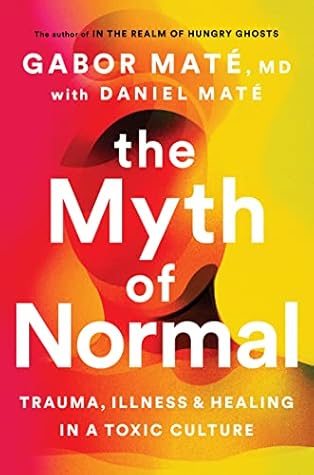More on this book
Community
Kindle Notes & Highlights
The fact that millions of people share the same vices does not make these vices virtues, the fact that they share so many errors does not make the errors to be truths, and the fact that millions of people share the same forms of mental pathology does not make these people sane. —Erich Fromm, The Sane Society
How are we to understand that in our modern world, at the pinnacle of medical ingenuity and sophistication, we are seeing more and more chronic physical disease as well as afflictions such as mental illness and addiction?
I have come to believe that behind the entire epidemic of chronic afflictions, mental and physical, that beset our current moment, something is amiss in our culture itself, generating both the rash of ailments we are suffering and, crucially, the ideological blind spots that keep us from seeing our predicament clearly, the better to do something about it.
globalized capitalism, which, in the words of the cultural historian Morris Berman, has become the “total commercial environment that circumscribes an entire mental world.”
In the United States, the richest country in history and the epicenter of the globalized economic system, 60 percent of adults have a chronic disorder such as high blood pressure or diabetes, and over 40 percent have two or more such conditions.[4] Nearly 70 percent of Americans are on at least one prescription drug; more than half take two.
Millions of North American children and youths are being medicated with stimulants, antidepressants, and even antipsychotic drugs whose long-term effects on the developing brain are yet to be established—a perilous social experiment in the chemical control of young people’s brains and behavior.
“the most obvious, ubiquitous, important realities are often the ones hardest to see and talk about.”
If we could begin to see much illness itself not as a cruel twist of fate or some nefarious mystery but rather as an expected and therefore normal consequence of abnormal, unnatural circumstances, it would have revolutionary implications for how we approach everything health related.
Peter Levine has written that certain shocks to the organism “can alter a person’s biological, psychological, and social equilibrium to such a degree that the memory of one particular event comes to taint, and dominate, all other experiences, spoiling an appreciation of the present moment.”[2]
“All trauma is preverbal,” the psychiatrist Bessel van der Kolk has written.
“Trauma is not what happens to you but what happens inside you”
“Trauma is perhaps the most avoided, ignored, belittled, denied, misunderstood, and untreated cause of human suffering.”
Such non-events are what the British pediatrician D. W. Winnicott referred to as “nothing happening when something might profitably have happened”—a subject we will return to when we consider human development.
If, despite decades of evidence, “big-T trauma” has barely registered on the medical radar screen, small-t trauma does not even cause a blip.
The last place you want to be is in your body. And so, you begin to live in your head, you begin to live up here without any ability to protect your body, to know your body. Look, I had a tumor the size of an avocado inside me, and I didn’t know it—that’s how separated I was from myself.”
these coping mechanisms ride in on the wings of grace, as it were, to save our lives in the short term.
“We have feelings because they tell us what supports our survival and what detracts from our survival,” the late neuroscientist Jaak Panksepp once said.
Response flexibility is a function of the midfrontal portion of our cerebral cortex. No infant is born with any such capacity: babies’ behavior is governed by instinct and reflex, not conscious selection. The freedom to choose develops as the brain develops. The more severe and the earlier the trauma, the less opportunity response flexibility has to become encoded in the appropriate brain circuits, and the faster it becomes disabled. One becomes stuck in predictable, automatic defensive reactions, especially to stressful stimuli. Emotionally and cognitively, our range of movement becomes
...more
We pass on to our offspring what we haven’t resolved in ourselves. The home becomes a place where we unwittingly re-create, as I did, scenarios reminiscent of those that wounded us when we were small.
Unless we can measure something, science won’t concede it exists, which is why science refuses to deal with such “nonthings” as the emotions, the mind, the soul, or the spirit. —Candace Pert, Ph.D., Molecules of Emotion


